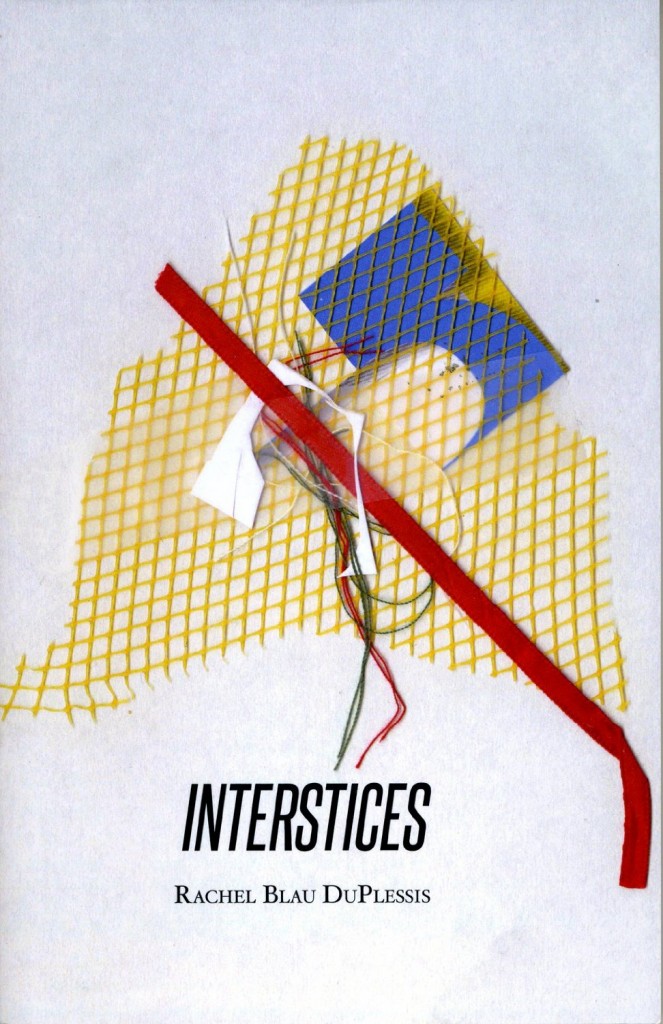
ISBN-13: 978-1930068643
Published January 15, 2014
Available at Amazon.com and SPDBooks.org
For those of us who fell in love with the putative end of DuPlessis’s lifework, Drafts—‘Volta! Volta!’—it’s a serious pleasure to discover that it has indeed taken a turn, the serial poem plumbing its manifold interstices for a way to ‘unbegin,’ and in so doing discovering new ‘ways of exceeding itself / and of losing itself / in strings of letters.’ INTERSTICES, however, also begins the work of turning back to look upon a life spent in letters, and what I love most about this brave, witty book is that it’s ultimately about being—in time, in language, in relation—a condition by nature contingent, partial, and mortal. ‘Not to so easy to answer what it’s like to be in time,’ it admits, ‘counting up / the little bits of self and / understanding.’ But what makes this book so miraculous and wise is that its ledgers and letters account for the thrill of the imagination and desire alive in language even while the writing mind knows how the ultimate sentence ends. ‘Let us meet it where we stand,’ these poems declare, and ‘enter the darkness mindfully.’ The great gift of this book is that it makes such high hopes seem possible.
—Brian Teare
See Rachel Blau DuPlessis reading “Letter 8” from Interstices at the Kelly Writers House here.
In her first book since the conclusion of Drafts (Surge: 96-114), Rachel Blau DuPlessis has shaken language out, “dismantled it,” and then reconstructed it. Interstices is writing and reading between the lines but formally is epistolary (a series of letters to friends, real or imagined, alive or dead) and is also about “keeping books” in sets called “Ledgers.”
At the end there is only structure
a grid of girders.
One meaning of ìledger
is horizontal timber.
As if one were building a house of words. And this structure with its spaces and gaps is likened to “networks caught in networks,” to multiple if not infinite connections and breaks. These are the interstices.
A reader may intuit these underlying structures, but the opposition, the turn toward chaos, is also there:
O Babel left in rubble,
a map of seams as large as the remains.
These terms, these tensions are given play throughout this work, these words, these worlds. Play: laughing and punning to the end.
—Beverly Dahlen, author of A Reading
Poet-critic Rachel Blau DuPlessis (Ph.D., Columbia University) is known as a feminist critic and scholar with a special interest in modern and contemporary poetry, and as a poet and essayist. Blue Studios: Poetry and Its Cultural Work, a book of essays, was published by University of Alabama Press in 2006; in the same year, Alabama reprinted DuPlessis’s classic work The Pink Guitar: Writing as Feminist Practice. Another recent critical book by DuPlessis is Genders, Races, and Religious Cultures in Modern American Poetry, 1908-1934 (Cambridge University Press, 2001). Her books of poetry are Drafts 1-38, Toll (Wesleyan University Press, 2001) and DRAFTS. Drafts 39-57, Pledge with Draft, Unnumbered: Précis (Salt Publishing, 2004). A poem from this book appears in American Poetry 2004. Torques: Drafts 58-76 appeared from Salt Publishing in October 2007 and Pitch: Drafts 77-95 is in press with Salt Publishing.

